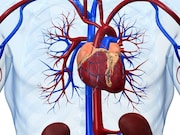Adjustment for subclinical brain disease markers did not reduce link between arterial stiffness, dementia
WEDNESDAY, Nov. 21, 2018 (HealthDay News) — Arterial stiffness may predict dementia risk, independent of subclinical brain damage, according to a study recently published in the Journal of Alzheimer’s Disease.
Chendi Cui, from the University of Pittsburgh Graduate School of Public Health, and colleagues used data from 532 nondemented older adults participating in the Cardiovascular Health Study Cognition Study. Participants had annual cognitive exams from 1998-1999 through 2013. Carotid-femoral pulse wave velocity (cfPWV) was measured for 356 participants (mean age, 78 years; 59 percent women) between 1996 and 2000.
The researchers found that during 15 years, 212 (59.6 percent) participants developed dementia, with a median time from cfPWV measurement of four years. cfPWV was significantly associated with an increased risk for dementia after adjustment for age and sex, but systolic blood pressure, mean arterial pressure, and pulse pressure were not. After further adjustment for education, race, APOE ε4, diabetes, body mass index, mean arterial pressure, and antihypertensive medication, cfPWV remained significantly associated with dementia risk (hazard ratio, 1.6). Results remained after additional adjustment for baseline global cognition, subclinical brain measures, and coronary artery calcification. Higher cfPWV was also associated with lower physical activity intensity and higher systolic blood pressure, heart rate, and waist circumference measured five years prior.
“It’s very surprising that adjusting for subclinical brain disease markers didn’t reduce the association between arterial stiffness and dementia at all,” Cui said in a statement.
Copyright © 2018 HealthDay. All rights reserved.








